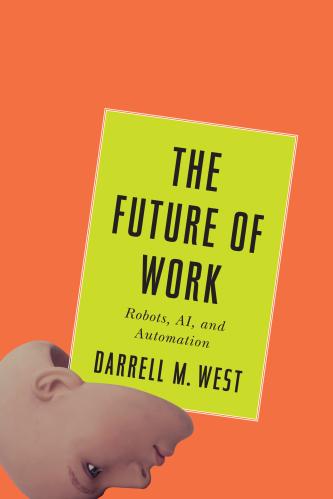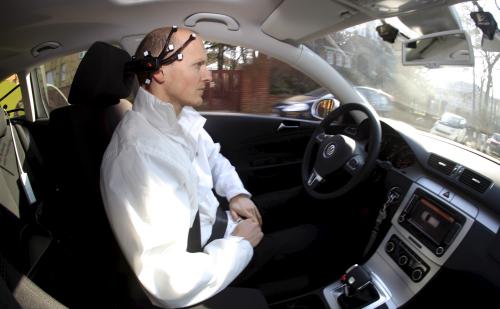Fifty-two percent of adult internet users believe within 30 years, robots will have advanced to the point where they can perform most of the activities currently done by humans, according to a survey undertaken by researchers at the Brookings Institution. The poll also found people divided 32 to 29 percent regarding whether the U.S. government should set up a Federal Robotics Commission to regulate robot development and usage.
This survey was undertaken by researchers at the Brookings Institution through an online U.S. national poll of 2,021 adult internet users between June 4 and 6, 2018. It was overseen by Darrell M. West, vice president of Governance Studies and director of the Center for Technology Innovation at the Brookings Institution and the author of The Future of Work: Robots, AI, and Automation. Responses were weighted by gender, age, and region to match the demographics of the national internet population as estimated by the U.S. Census Bureau’s Current Population Survey.
Will robots take over?
The survey asked how likely robots are to take over most human activities within the next 30 years. Nineteen percent feel this was very likely, 33 percent believes this is somewhat likely, 23 percent feel it is not very likely, and 25 percent were not sure.
There were not significant differences by demographic group or region. People aged 35 to 54 were a bit more likely to believe this was very likely, compared to those living in the South or adults under the age of 35. Males and older individuals were the ones most likely to say this was not very likely to happen.
Federal Robotics Commission
Thirty-two percent believe the U.S. government should set up a Federal Robotics Commission to regulate robot development and usage, compared to 29 percent opposed and 39 percent who were unsure.
But there are some differences by age and region. Young people aged 18 to 34 years old were the most likely to want to regulate robots (39 percent), as were those living in the Northeast or West. Men, older individuals, and those living in the South were the least supportive of robot regulation.
Comfort level and worries about robots
We asked several questions regarding people’s impressions of robots. Sixty-one percent said they were uncomfortable with robots, while only 16 percent felt comfortable with robots and 23 percent were unsure.
Thirty-eight percent felt robots would make their lives easier in the next five years, while 17 percent felt their lives would become harder and 45 percent did not know.
When asked how worried they were about robots, 61 percent said they were unworried, while 29 percent were worried and 22 percent were not sure.
When asked how common they thought robots would become over the next five years, 13 percent said very common, 32 percent said somewhat common, 26 percent felt they would not be very common, and 29 percent did not know.
Kind of robots wanted
We asked about the kinds of robots that would interest them. Twenty percent were interested in robots that would help them clean house, 17 percent wanted robots that would provide home security, and only 9 percent were interested in a robot that helps to care for a child or aging relative.
How much would you pay for a robot
The survey inquired how much people would pay for a robot that handles routine chores. Forty-two percent said they would pay $250 or less, 10 percent said they would pay between $251 and $500, 3 percent said they would pay from $501 and $750, 3 percent indicated they would pay between $751 and $1,000, and 3 percent were willing to pay more than $1,000. Thirty-nine percent did not provide a figure.
There were some differences by age. Young people under the age of 35 were more interested in inexpensive robots under the cost of $250 (47 percent) compared to those who were 55 years or older (37 percent).
Survey Questions and Answers
1. How interested are you in having a robot that helps clean your home?
- 56% very disinterested
- 12% somewhat disinterested
- 8% somewhat interested
- 12% very interested
- 12% don’t know or no answer
2. How interested are you in having a robot that provides security for your home?
- 53% very disinterested
- 14% somewhat disinterested
- 8% somewhat interested
- 9% very interested
- 16% don’t know or no answer
3. How interested are you in having a robot that helps care for a child or aging relative?
- 71% very disinterested
- 13% somewhat disinterested
- 4% somewhat interested
- 5% very interested
- 7% don’t know no answer
4. How much would you be willing to pay for a robot that handles routine chores for you?
- 42% $1 to $250
- 10% $251 to $500
- 3% $501 to $750
- 3% $751 to $1,000
- 3% Over $1,000
- 39% don’t know or no answer
5. How common do you expect robots to become over the next five years?
- 13% very common
- 32% somewhat common
- 26% not very common
- 29% don’t know or no answer
6. How comfortable are you with robots?
- 41% very uncomfortable
- 20% somewhat uncomfortable
- 9% somewhat comfortable
- 7% very comfortable
- 23% don’t know or no answer
7. How worried are you about robots?
- 40% very unworried
- 21% somewhat unworried
- 8% somewhat worried
- 9% very worried
- 22% don’t know or no answer
8. Over the next five years, do you expect robots will make your life:
- 20% much easier
- 18% somewhat easier
- 6% somewhat harder
- 11% much harder
- 45% don’t know or no answer
9. In 30 years, how likely will it be that robots have advanced to the point where they can perform most of the activities currently done by humans?
- 19% very likely
- 33% somewhat likely
- 23% not very likely
- 25% don’t know or no answer
10. Do you think the U.S. government should set up a Federal Robotics Commission to regulate robot development and usage?
- 32% yes
- 29% no
- 39% don’t know or no answer
Gender:
- 49.1% male, 50.9% female in sample
- 47.9% male, 52.1% female in target population
Age:
- 12.2% 18-24, 20.8% 25-34, 19.4% 35-44, 18.5% 45-54, 16.2% 55-64, 12.8% 65+ in sample
- 13.9% 18-24, 19.4% 25-34, 17.8% 35-44, 18.3% 45-54, 16.4% 55-64, 14.2% 65+ in target population
Region:
- 29.6% Northeast, 14.6% Midwest, 32.9% South, 22.8% West in sample
- 18.0% Northeast, 22.0% Midwest, 36.4% South, 23.6% West in target population
Survey Methodology
This online survey polled 2,021 adult internet users in the United States June 4 to 6, 2018 through the Google Surveys platform. Responses were weighted using gender, age, and region to match the demographics of the national internet population as estimated by the U.S. Census Bureau’s Current Population Survey.
In the 2012 presidential election, Google Surveys was the second most accurate poll of national surveys as judged by polling expert Nate Silver. In addition, the Pew Research Center undertook a detailed assessment of Google Surveys and found them generally to be representative of the demographic profile of national internet users. In comparing Google Survey results to its own telephone polls on 43 different substantive issues, Pew researchers found a median difference of about three percentage points between Google online surveys and Pew telephone polls. A 2016 analysis of Google Surveys published in the peer-reviewed methodology journal Political Analysis by political scientists at Rice University replicated a number of research results and concluded “GCS [Google Consumer Surveys] is likely to be a useful platform for survey experimentalists.”
This research was made possible by Google Surveys, which donated use of its online survey platform. The questions and findings are solely those of the researchers and not influenced by any donation. For more detailed information on the methodology, see the Google Surveys Whitepaper.
The Brookings Institution is committed to quality, independence, and impact.
We are supported by a diverse array of funders. In line with our values and policies, each Brookings publication represents the sole views of its author(s).












Commentary
Brookings survey finds 52 percent believe robots will perform most human activities in 30 years
June 21, 2018